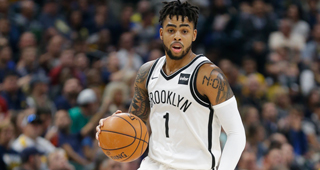Ah yes, the Player Empowerment Era: where a guy can get dumped by the team that drafted him, make the best of his new surroundings, and then get shipped to a third franchise that doesn’t even want him. D’Angelo Russell got paid on Sunday evening, but that was always going to happen. When a 23-year-old guard averages 21 and 7, contract negotiations take only as long as the print job and the signatures do. The surprising thing is that, given the Nets weren’t interested in bringing Russell back, he wasn’t committing his future to the Mavericks or Timberwolves, youngish clubs that could use a pick and roll ace, but instead the Warriors, who perhaps never appeared in the same sentence as D’Angelo Russell before Bob Myers asked about acquiring him in a sign-and-trade once he knew Kevin Durant was headed to Brooklyn anyway.
It’s a move that makes sense for Golden State. They were set to lose Durant for nothing, and Russell is considerably better than nothing. Beyond that, this is in all likelihood an asset play rather than some avant garde on-court retooling. D’Angelo and Steph Curry overlap just about everywhere, except in areas where Steph is far superior, and Steve Kerr’s vertebrae rattle like wind chimes when he sees one of his big men set a screen at the top of the key. Marc Stein’s read on the situation feels correct: Russell’s ball-dominant stylings make him, at best, an awkward fit next to Curry, and he’s extremely likely to get traded again by the beginning of next season. He’s in San Francisco on an interim basis, to open the Chase Center, chip in some points in Klay Thompson’s absence, and yearn for a range life.
This doesn’t seem fair to someone who was run out of Los Angeles by no less than the greatest point guard of all-time, considered a mild bust as recently as a year ago, and in his fourth year transformed himself into a star. There’s a conversation to be had about the sustainability of what was by far Russell’s best season as a pro—a lot of tough jumpers contributed to those scoring totals—but he was the primary creative force on a half-decent and wildly likeable squad. That’s a real accomplishment, and it marks either the ascendance of a bona fide star or the establishment of a pretty damn good player.
The Nets are moving on from Russell in favor of Kyrie Irving, a brighter and more proven talent who also functioned as the patchouli-stankin’ lure that brought Durant to Brooklyn. This is a fine decision to make, but very rarely do promising restricted free agents get rejected by their own teams. (Sometimes it’s the exact inverse. The player begs his franchise not to match an offer sheet and they retain him anyway.) Until Sunday, it was looking like D’Angelo would be afforded the privilege of picking his next team, a sort of serendipitous reward for the work he had put in to get his game all the way to the level it has now reached. There are worse fates than a precarious gig in Golden State, but Russell is wanted there for a dissatisfying reason. It’s not because the Warriors particularly like him, but because other front offices do.
Russell’s limbo status serves as a pretty strong argument against any grumbling about restless or fickle players. You’ll notice that the guys who have turned heel in a bad situation—Anthony Davis, Kyrie Irving, Jimmy Butler—have tended to be in their mid-to-late 20s, the age at which an NBA athlete finally has a significant say in where he’s allowed to play basketball. If Davis showing up to what he was trying to make sure was the final game of his Pelicans career in a “That’s All Folks!” t-shirt was hack and tasteless, it was also the culmination of spending seven years bound to a franchise that’s run by a dysfunctional family of football fans and has never been well-supported by its city. Davis wanted out in part because he never chose to be in. So when he got even a little bit of leverage, he scrambled to use it. You can blame him for being clumsy, but on a basic level, he was responding to his predicament rationally enough.
There’s no guarantee things would have worked out for D’Angelo Russell in Minnesota or Dallas or wherever else he might have wanted to go. Even with the benefit of unrestricted free agency, players sign deals that they end up regretting later on. But at least they do this to themselves. They make a commitment and then discover they’re not seeing enough of the ball, or the coach proves difficult to get along with, but that’s where the contract becomes a two-way street. In these cases, the franchise has every right to remind the player that they said they would be around for four seasons, even if things broke bad in the middle of the second one.
It’s still possible that Russell ends up getting traded somewhere he would have wanted to be anyway, and there’s a slim chance he and the Warriors fall in love with each other and he settles down in San Francisco. But there was a moment there where it looked like, for once, a 23-year-old All-Star was going to be permitted to set his own path. That sort of thing never happens. It didn’t this time either.



